Politics
Justice Mansoor Ali Shah says appropriate to recuse from bench amid doubts
Published
3 years agoon
By
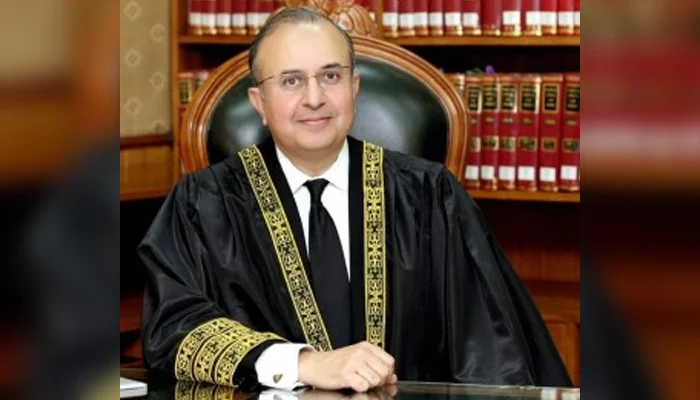
- Justice Mansoor Ali Shah’s recusal came after govt’s objection.
- Appropriate to recuse if doubts arise: Justice Shah.
- “Petitioner is admittedly my relative,” judge confirms in note.
ISLAMABAD: After deciding to recuse himself from the bench hearing a plea against the trial of civilians in military courts, senior Supreme Court judge Syed Mansoor Ali Shah said it is appropriate to take the step if doubts arise in an ordinary person’s mind about a judge’s impartiality.
Headed by Chief Justice Umer Ata Bandial, a six-member bench of the Supreme Court issued a written order addressing the petitions challenging civilians’ trials in military courts.
Meanwhile, the government raised objections over Justice Shah’s inclusion in the bench following his personal association with the petitioner and former chief justice Khawaja.
In his separate note, Justice Shah said that judges should not readily accede to the request for their recusal from hearing a case and decide the matter of their recusal after properly weighing the ground agitated for making such a request.
Justice Shah said that where it was apparent that the perception of impartiality was being created for some ulterior motive sans any sound basis, the judge must not yield to such strategy and abdicate the performance of his duty.
But if such a request is based on some reasonable ground that may genuinely raise doubt in the mind of a common person about the impartiality of the judge, the safest course for the judge is to accept such request in the larger interest of upholding public trust in the integrity and impartiality of the court, he observed.
“In the present case, as the said petitioner is admittedly my relative, a common person may not understand the difference between a petition filed in the public interest and a petition filed for personal interest,” the senior judge added.
He further said that in the present case, he found it preferable to accept the request and recuse himself from hearing the case.
“Keeping in view the above principles and reasons, in order to safeguard the public trust in the integrity and impartiality of the court, I recuse myself from hearing these petitions on the objection raised by the learned Attorney-General for Pakistan on instructions from the Federal Government,” Justice Shah said.
The senior judge said it is not merely of some importance but is of fundamental importance that justice should not only be done, but should manifestly and undoubtedly be seen to be done.
“I strongly believe in this dictum of Lord Hewart and have expressed similar views in several cases that the foundations of the judicial institution stand on, and its real strength lies in, the public trust which gives to its decisions legitimacy and public acceptance,” the judge observed.
Justice Shah further said that anything which undermined or even tended to undermine the public trust in the integrity, impartiality and independence of the judiciary must be circumvented.
“The petitioner in one of these petitions, namely, Jawad S. Khawaja, the former Chief Justice of Pakistan, is my relative. The legal fraternity, I believe, knew it and for those who did not I disclosed this fact at the first hearing of these petitions in open court on June 22 and asked whether anyone had any objection to my hearing these petitions including the learned Attorney-General for Pakistan.
“However, counsel for the petitioners in all these petitions and the learned Attorney-General for Pakistan replied that they had no objection,” said Justice Mansoor Ali Shah.
The judge further said that Article 4 of Code of Conduct to be observed by the judges of the supreme court and high courts mandates that a “Judge must decline resolutely to act in a case involving his own interest, including those of persons whom he regards and treats as near relatives or close friend.”
The said petitioner has, however, filed the petition in the public interest, not involving any interest of his own as he is not to be personally affected by the decision of these cases in either way. “I, therefore, was of the view that the said Article was not applicable in this case, still I thought it right to ask the parties, at the start of the hearing, whether they had any objection to my sitting on the bench and hearing these petitions,” Justice Shah said.
“I did not recuse myself from hearing these petitions on my own, as I thought that my recusal without any objection from any of the parties may amount to abdication of my duty to preserve, protect and defend the Constitution in a matter of constitutional significance and public importance involving the question of enforcement of the fundamental rights to life, liberty, dignity, due process and fair trial,” the judge observed.
He said the judicial impartiality upholds public trust, engenders predictability in the law, ensures fair trial, upkeeps the rule of law and safeguards democracy.
“The principle of judicial impartiality, therefore, is not merely a moral imperative but a practical necessity to ensure justice, uphold democratic values, protect citizens’ rights, and maintain societal order,” Justice Shah said.
You may like
-
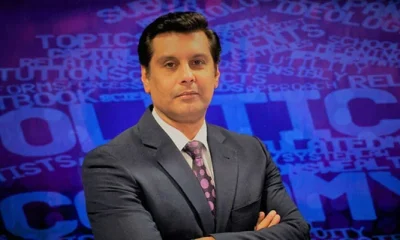

Arshad Sharif’s wife files lawsuit against Kenyan police over journalist’s killing
-
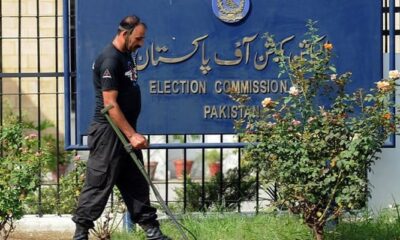

PTI urges ECP to issue order on election symbol
-
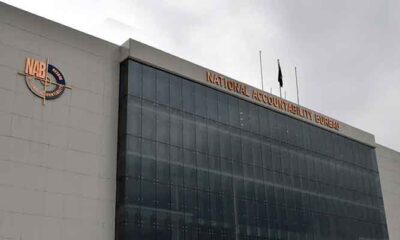

Task force on the cards as NAB aims to boost accountability process
-
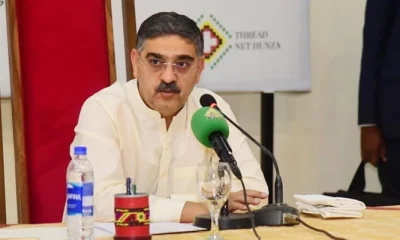

PM Kakar to attend UN climate moot in UAE next month
-
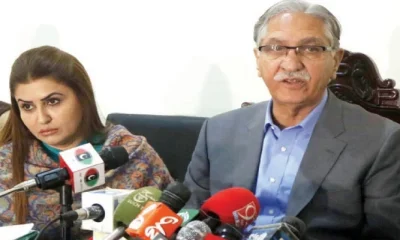

PPP raises concerns over ‘special relief’ to Nawaz on return
-
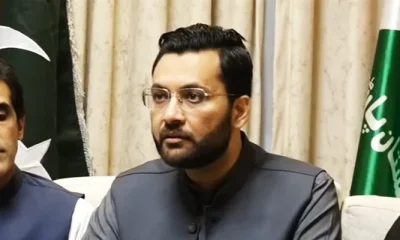

Farrukh Habib parts ways with Imran Khan-led PTI

In a unanimous verdict, a five-member bench of the Supreme Court on Monday declared civilians’ trials in military courts null and void as it admitted the petitions challenging the trial of civilians involved in the May 9 riots triggered by the arrest of Pakistan Tehreek-e-Insaf (PTI) chief Imran Khan in a corruption case.
The five-member apex court bench — headed by Justice Ijaz Ul Ahsan, and comprising Justice Munib Akhtar, Justice Yahya Afridi, Justice Sayyed Mazahar Ali Akbar Naqvi and Justice Ayesha Malik — heard the petitions filed by the PTI chief and others on Monday.
The larger bench in its short verdict ordered that 102 accused arrested under the Army Act be tried in the criminal court and ruled that the trial of any civilian if held in military court has been declared null and void.
The apex court had reserved the verdict earlier today after Attorney General of Pakistan (AGP) Mansoor Usman Awan completed his arguments centred around the domain and scope of the military courts to try the civilians under the Army Act.
At the outset of the hearing today, petitioner lawyer Salman Akram Raja told the bench that trials of civilians already commenced before the top court’s verdict in the matter.
Responding to this, Justice Ahsan said the method of conducting proceedings of the case would be settled after Attorney General of Pakistan (AGP) Mansoor Usman Awan completed his arguments.
Presenting his arguments, the AGP said he would explain to the court why a constitutional amendment was necessary to form military courts in 2015 to try the terrorists.
Responding to Justice Ahsan’s query, AGP Awan said the accused who were tried in military courts were local as well as foreign nationals.
He said the accused would be tried under Section 2 (1) (D) of the Official Secrets Act and a trial under the Army Act would fulfill all the requirements of a criminal case.
“The trial of the May 9 accused will be held in line with the procedure of a criminal court,” the AGP said.
The AGP said the 21st Amendment was passed because the terrorists did not fall in the ambit of the Army Act.
“Amendment was necessary for the trial of terrorists [then] why amendment not required for the civilians? At the time of the 21st constitutional amendment, did the accused attack the army or installations?” inquired Justice Ahsan.
AGP Awan replied that the 21st Amendment included a provision to try accused involved in attacking restricted areas.
“How do civilians come under the ambit of the Army Act?” Justice Ahsan asked the AGP.
Justice Malik asked AGP Awan to explain what does Article 8 of the Constitution say. “According to Article 8, legislation against fundamental rights cannot be sustained,” the AGP responded.
Justice Malik observed that the Army Act was enacted to establish discipline in the forces. “How can the law of discipline in the armed forces be applied to civilians?” she inquired.
The AGP responded by saying that discipline of the forces is an internal matter while obstructing armed forces from discharging duties is a separate issue.
He said any person facing the charges under the Army Act can be tried in military courts.
“The laws you [AGP] are referring to are related to army discipline,” Justice Ahsan said.
Justice Malik inquired whether the provision of fundamental rights be left to the will of Parliament.
“The Constitution ensures the provision of fundamental rights at all costs,” she added.
If the court opened this door then even a traffic signal violator will be deprived of his fundamental rights, Justice Malik said.
The AGP told the bench that court-martial is not an established court under Article 175 of the Constitution.
At which, Justice Ahsan said court martials are not under Article 175 but are courts established under the Constitution and Law.
After hearing the arguments, the bench reserved the verdict on the petitions.
A day earlier, the federal government informed the apex court that the military trials of civilians had already commenced.
After concluding the hearing, Justice Ahsan hinted at issuing a short order on the petitions.
The government told the court about the development related to trials in the military court in a miscellaneous application following orders of the top court on August 3, highlighting that at least 102 people were taken into custody due to their involvement in the attacks on military installations and establishments.
Suspects express confidence in mly courts
The same day, expressing their “faith and confidence” in military authorities, nine of the May 9 suspects — who are currently in army’s custody — moved the Supreme Court, seeking an order for their trial in the military court be proceeded and concluded expeditiously to “meet the ends of justice”.
Nine out of more than 100 suspects, who were in the army’s custody, filed their petitions in the apex court via an advocate-on-record.
The May 9 riots were triggered almost across the country after former prime minister Imran Khan’s — who was removed from office via a vote of no confidence in April last year — arrest in the £190 million settlement case. Hundreds of PTI workers and senior leaders were put behind bars for their involvement in violence and attacks on military installations.
Last hearing
In response to the move by the then-government and military to try the May 9 protestors in military courts, PTI Chairman Imran Khan, former chief justice Jawwad S Khawaja, lawyer Aitzaz Ahsan, and five civil society members, including Pakistan Institute of Labour Education and Research (Piler) Executive Director Karamat Ali, requested the apex court to declare the military trials “unconstitutional”.
The initial hearings were marred by objections on the bench formation and recusals by the judges. Eventually, the six-member bench heard the petitions.
However, in the last hearing on August 3, the then-chief justice Umar Ata Bandial said the apex court would stop the country’s army from resorting to any unconstitutional moves while hearing the pleas challenging the trial of civilians in military courts.
A six-member bench, led by the CJP and comprising Justice Ijaz Ul Ahsan, Justice Munib Akhtar, Justice Yahya Afridi, Justice Sayyed Mazahar Ali Akbar Naqvi, and Justice Ayesha Malik, heard the case.
In the last hearing, the case was adjourned indefinitely after the Attorney General for Pakistan (AGP) Mansoor Usman Awan assured the then CJP that the military trials would not proceed without informing the apex court.
Politics
Arshad Sharif’s wife files lawsuit against Kenyan police over journalist’s killing
Published
2 years agoon
By
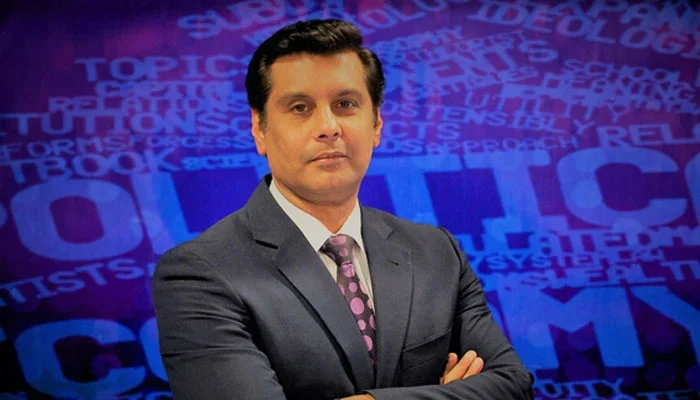
- Javeria Siddique filed lawsuit to “get justice for her husband”.
- Lawsuit also seeks “public apology” from Kenyan attorney general.
- Journalist was shot dead in October 2022 by Kenyan police officers.
NAIROBI: Slain journalist Arshad Sharif’s wife has registered a case against the Kenyan Elite police unit for her husband’s murder in Kenya, reported The News.
Javeria Siddique in her petition has made the attorney general of Kenya, national police service of the country and the director public prosecution respondents.
She has urged that the officers involved in Sharif’s murder be put on trial and be punished for their crime.
She urged the court to issue directives to the Kenyan attorney general (AG) to apologise to Sharif’s family within seven days of court’s orders, admit facts, accept responsibility and issue a written apology at public level.
Sharif’s widow, while confirming the filing of the case, said: “I have got a case registered in Nairobi for seeking justice in murder case of my husband. We got the case registered against general service unit of Kenya because they committed crime publicly and then admitted it was matter of mistaken identity. But to me it was targeted murder. But Kenyan government never apologised. They never contacted us.”
The registration of the case comes after it was reported the five Kenyan police officers who were involved in the killing quietly resumed their duties without any action taken against them.
Nine months after the killing of the journalist at a roadblock in a remote part of the East African country, the five police officers involved in the brutal killing are enjoying full police perks and their suspensions have turned out to be only a whitewash by the Kenyan authorities.
A trusted security source revealed that the five cops involved in the fatal shootout are back to work and two of them have been promoted to senior ranks.
Kenya’s Independent Policing and Oversight Authority (IPOA), the body that is tasked with investigating the conduct of police officers, despite making a promise to give an update on Sharif’s murder within weeks has not made its findings public in over nine months.
Sharif had arrived in the Kenyan capital on August 20 and died on October 23 last year in a shootout in which his driver Khurram Ahmad survived miraculously.
The 49-year-old had fled Pakistan in August to avoid arrest after he was slapped with several cases including sedition charges over an interview with Shahbaz Gill, a former aide of Imran Khan.
After reaching Kenya’s capital Nairobi, Sharif stayed at the Riverside penthouse of businessman Waqar Ahmad who is also Khurram’s brother who was driving him when he was killed.
The journalist was being driven from Ammodump Kwenia training camp, a joint which is owned by Waqar and they were heading to Nairobi County where he was staying.
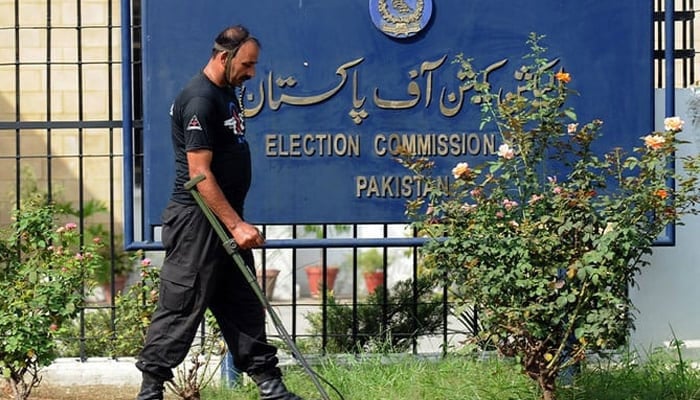
- ECP notice on inter-party elections “serious mistake,” says PTI.
- ECP has no justification for depriving PTI of symbol: Senator Zafar.
- 41 days passed but detailed decision not issued yet: PTI’s counsel.
ISLAMABAD: The Pakistan Tehreek-e-Insaf (PTI) has urged the Election Commission of Pakistan (ECP) to issue its verbal order regarding issuance of election symbol and reminded the electoral body of its constitutional duty to hold free and fair elections in the country, The News reported on Thursday.
Senator Barrister Syed Ali Zafar, the party’s counsel, on Wednesday filed an application with the Election Commission requesting for issuance of a detailed written order in the interest of justice and fairness.
The party has urged the Election Commission to issue a detailed decision without delay in light of its announcement concerning issuance of election symbols.
According to Senator Zafar, the Election Commission had issued a notice to the PTI for refusing to issue the symbol of “bat” on the basis of intra-party elections.
He insisted the commission’s notice on the basis of inter-party elections was a serious mistake, as the PTI had held intra-party elections on June 9, 2022 as per its constitution.
He maintained that the ECP had no justification of depriving the PTI of its symbol after holding the intra-party elections, as the electoral body had never objected to the intra-party elections but identified some defects in the submitted document, which had been removed.
The Election Commission in its August 30, 2023 decision, he pointed out, accepted the PTI’s decision to hold the intra-party elections and announced the decision to issue the election symbol of “bat” and after the August 30 decision of the Election Commission, the matter had become final and complete.
He recalled that at the time of the verbal announcement of the August 30 decision, the Election Commission announced to issue a detailed decision in this regard and this was widely highlighted in print, electronic and social media.
However, he noted, 41 days had passed since the August 30 decision, but a detailed decision had not yet been provided.
“PTI is the largest political party in the country, which is contesting the upcoming elections. Not issuing a detailed decision even after 41 days is a clear violation of fundamental rights, including articles 4, 9, 10A, 15, 16, 17 and 26 of the Constitution,” he said.
Ali Zafar insisted that according to the Constitution, the Election Commission was bound to hold free, fair, impartial and transparent elections, while avoiding detailed decisions was a deviation from this constitutional mandate.


Supreme Court annuls trials of civilians in military courts

Sea conditions ‘very high’ as Cyclone Tej moves towards northwestward

IMF condition: ECC set to green light gas tariff hike today

Barwaan Khiladi: Kinza Hashmi discusses her role as Alia

Snap launches tools for parents to monitor teens’ contacts

WATCH: Pakistani traveller deported from Dubai for damaging plane mid-air

Learn First | How to Create Amazon Seller Account in Pakistan – Step by Step

Sajjad Jani Funny Mushaira | Funny Poetry On Cars🚗 | Funny Videos | Sajjad Jani Official Team

